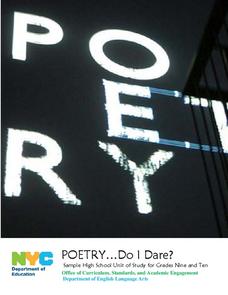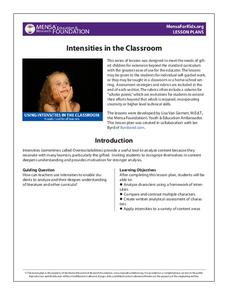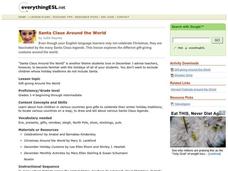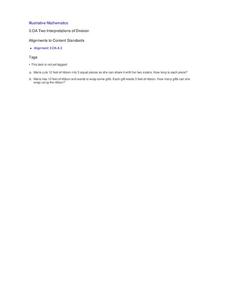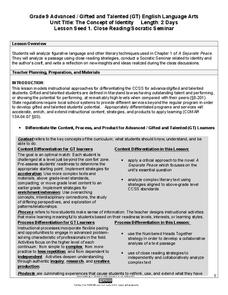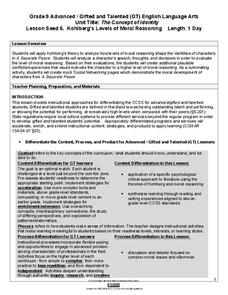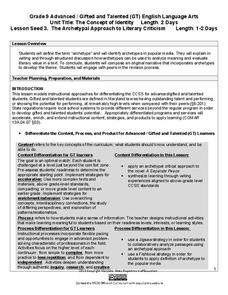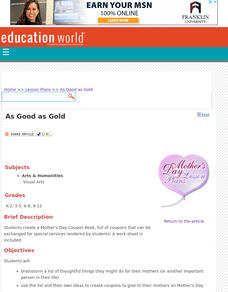New York City Department of Education
Poetry…Do I Dare?
Whether you're considering a poetry unit or just want to incorporate more poetry in your curriculum, this unit plan is a must-have. Packed with poems, teaching points, powerful prompts, and poetry performance suggestions, the resource is...
MENSA Education & Research Foundation
Intensities in the Classroom
Everyone learns and experiences life differently. A set of lessons about character intensities encourages middle and high schoolers to analyze themselves, their peers, and characters from a book based on the five listed intensities:...
Granite School District
Vocabulary Cards 1st Grade A-L
Help young mathematicians acquire key vocabulary with this printable resource. Three different cards are provided for each word; one with only the word, one with the word and a picture, and one with the word, a picture, and a definition....
Granite School District
Vocabulary Cards 1st Grade M-Z
Clarify key math vocabulary terms with this series of printable cards. Three different versions of each term are provided; one with only the word, one with the word and a picture, and one with the word, a picture, and a definition. Note...
Children's Museum of Indianapolis
Anne Frank: Facing Hatred, Daring to Dream
The stories of Anne Frank, Ruby Bridges, and Ryan White illustrate the power of children to make a difference. The three lesson in this must-have resource are designed to inspire young people to make a difference in their world....
Curated OER
Lady Liberty
If you're looking for a fantastic cross-curricular lesson on the Statue of Liberty, then this lesson is for you! Learners watch a Reading Rainbow episode which focuses on the Statue, then gather facts about the creation, construction,...
Curated OER
Wired with Alexander Calder
Kids consider how the body functions and moves, how each structure has a specific movement and purpose. They apply that idea as they construct a sculptural piece that moves. For inspiration they look to the work of Alexander Calder,...
Perkins School for the Blind
Integrated Skills - Laundry
I hate doing laundry, even if it is an independent living skill that requires me to count money, follow a sequence, and sort clothing by color. Learners with multiple disabilities discuss what laundry is, why they need to do it, and how...
Curated OER
Socratic Seminar on Martin Luther King, Jr.’s Letter From Birmingham Jail
Key in the struggle to gain the rights of democratic citizenship was the April 1963 arrest of Dr. Martin Luther King, Jr. for civil disobedience. To deepen their knowledge and understanding of events during the civil rights movement,...
Virginia Department of Education
Surface Area of a Rectangular Prism
Wrap up a lesson on surface area with a resource that asks scholars to use the idea of wrapping paper to investigate surface area. They draw representations of rectangular prisms on graph paper to find the areas of the respective...
Curated OER
Santa Claus Around the World
Learn about the legend of Santa Claus around the world in ESL holiday plan. In it, learners explore the many ways that Santa Claus is depicted in cultures around the world. There are some excellent masters included in the plan that help...
Illustrative Mathematics
Two Interpretations of Division
Division can be seen in two ways; as splitting a whole into a certain number of pieces, or splitting it into pieces of a certain size. Help your class reach this understanding with these two simple word problems. Encourage the use of...
Maryland Department of Education
The Concept of Identity Lesson 1: Close Reading/Socratic Seminar
John Knowles' A Separate Peace provides readers with an opportunity to develop their close reading and analytical skills as they look for what Knowles feels are the factors that shape our identity.
Maryland Department of Education
The Concept of Identity Lesson 2: The Historical/Biographical Approach
"How does our environment shape our identity?" After researching biographical information about John Knowles and considering how these experiences are reflected in A Separate Peace, class members consider the strengths and weaknesses of...
Maryland Department of Education
The Concept of Identity Lesson 5: Motivation - Maslow's Hierarchy of Needs
Maslow's Hierarchy of Needs provides the lens class members use to analyze and evaluate the motivations of the characters in Sylvia Plath's "Initiation" and scenes from Mean Girls. Readers then select a character from A...
Maryland Department of Education
The Concept of Identity Lesson 6: Kohlberg's Levels of Moral Reasoning
How does our moral reasoning shape our identity? After a study of Kohlberg's Levels of Moral Reasoning, readers use Kohlberg's theories to analyze the speech, thoughts, and decisions of a character in A Separate Peace. They then...
Maryland Department of Education
The Concept of Identity Lesson 7: Logical Fallacies
What are the effects of competition in an academic environment? The competition between the main characters in A Separate Peace motivates a series of activities that asks readers to take a stance on competition, and then to develop a...
Maryland Department of Education
The Concept of Identity Lesson 8: Propaganda in Visual Media
Visual and print propaganda are featured in a instructional activity that asks readers of A Separate Peace to examine the techniques used in propaganda from World War I, World War II, presidential elections, and in the novel.
Maryland Department of Education
The Concept of Identity Lesson 3: The Archetypal Approach to Literary Criticism
As class members continue their study of approaches to literary criticism, readers examine the symbolism and archetypal patterns in John Knowles' A Separate Peace, and how these parallels are used to develop a theme...
Maryland Department of Education
The Concept of Identity Lesson 4: The Psychological Approach
Readers apply Sigmund Freud's theories of the unconscious mind and the psychological approach to literary criticism to analyze and evaluate the relationship between two characters in A Separate Peace.
Maryland Department of Education
The Concept of Diversity in World Literature Lesson 12: Author's Purpose - Yeats and Achebe
Is there such a thing as fate/luck? Can one fight destiny? As part of their study of Chinua Achebe's purpose in writing Things Fall Apart, class members answer these questions from Achebe's point of view and then from William...
Curated OER
As Good as Gold
Students create a Mother's Day Coupon Book, full of coupons that can be exchanged for special services rendered by students!
Maryland Department of Education
The Concept of Diversity in World Literature Lesson 13: Unit Culmination - Symposium
To conclude a unit on the concept of diversity in world literature, class members conduct a symposium on "African Literature in Global Perspectives." In order to earn a spot on the panel, individuals craft an original thesis that...


